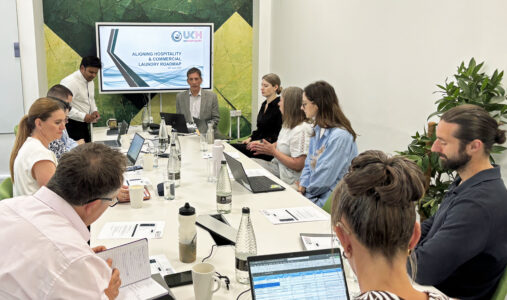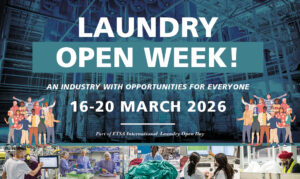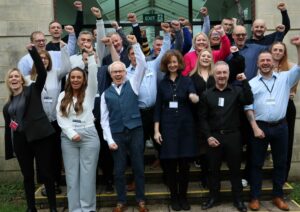Latest UKHospitality (UKH) and Textile Services Association (TSA) meeting focuses on aligning industries’ sustainability roadmaps
UKHospitality and the Textile Services Association are continuing their joint project to align both industries’ sustainability roadmaps, and to ensure their collaboration is on course. The associations’ latest meeting, on 25th June at Regus, London WC2, was attended by representatives of the TSA and UKH, as well as major players within the hospitality industry, including Center Parcs, Fraser Hospitality, Premier Inn and Travelodge.
The areas of discussion spread across the whole spectrum of sustainability and included carbon emissions figures, cotton traceability, single use plastics, textiles recycling, managing linen loss, alternative fabrics and ESG vetting – the reporting of a laundry’s environmental, social and governance policies.
Also in attendance were the TSA team, including CEO David Stevens, Jack Quick from UKH, Emma Littlewood of Green Element, who led the carbon emissions discussion, and Hannah MacVean of Better Cotton Initiative (BCI), who presented new ideas covering cotton traceability.
“These meetings have brought the hospitality and laundry industries closer together,” says David Stevens, CEO of the TSA. “The sustainability focus is already playing a significant role as we work together to achieve carbon net zero.”
The removal of single-use plastic is an example of this successful collaboration. Previously, most clean laundry was delivered to hospitality sites wrapped in plastic for protection. Where possible, this plastic has now been replaced by a variety of innovative delivery methods, removing up to 100 tonnes of plastic per week, saving 15,000 tonnes of CO2. The meeting was told that this equates to 5,000 return flights from Heathrow to Perth – every week!

A key area for discussion was the increasing interest hotels have in laundries’ carbon emission figures – so much so that they are now included in most tender processes. TSA worked with Green Element to launch the GLARE platform for laundries, which makes the process of uploading the data to calculate the carbon figures relatively simple. Hotels particularly liked that fact that even data ‘per hotel customer’ can be provided to them. The meeting heard that the GLARE platform will also be useful in determining if alternative fabrics are more environmentally friendly.
Cotton traceability has been complex in the past, particularly for businesses looking at more sustainable options. Hannah MacVean told the meeting that BCI is developing ways to trace cotton not only back to the country of origin, but directly to the farm, so users have insight and assurance over the provenance of the cotton. This will also enable the end user to know if BCI cotton is present within the product, which could not be guaranteed previously. David Stevens says, “We all agreed on the need to support farmers from an environmental and social aspect. TSA and BCI are working together to develop a viable solution.”
The meeting also had an update on the Infinite Textiles scheme, including the TSA discussions with DEFRA about the fact that there are no end-of-life recycling facilities for textiles in the UK capable of meeting the association’s criteria and supply. Meanwhile, with 61% of hospitality linen being lost every year, the TSA has been campaigning on training staff to look after it, notably with the highly successful Pasha the Pillowcase animation. The figures are improving, but are still dire. At the meeting, UKH and the TSA agreed to talk again to the UKHA (the UK Housekeepers Association) to work out a joint plan of action to continue the campaign.
The next UKH and TSA roundtable meeting will be on 16th September at the Hampton By Hilton, London, SE1 8XA. It will be attended by representatives from both laundries and hotels.
If you have any queries, please do not hesitate to get in touch with us either via email or phone:
T +44 (0) 20 3151 5600






